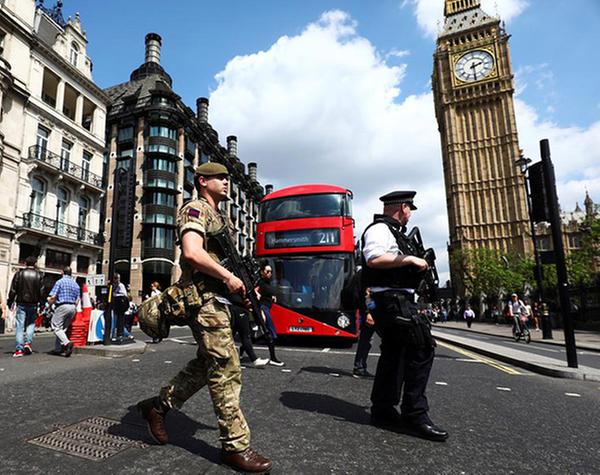In shadow of deadly attacks, British election campaign resumes

 |
| A soldier and an armed policeman pass Big Ben in London, Britain, May 24, 2017. [Photo/Agencies] |
Shadow of attacks
While British pollsters all predict May will win the most seats in Thursday's election, they have given an array of different numbers for how big her win will be, ranging from a landslide victory to a much more slender win without a majority.
Some polls indicate the election could be close, possibly throwing Britain into political deadlock just days before formal Brexit talks with the European Union are due to begin on June 19.
In a sign of how much her campaign has soured just five days before voting begins, May's personal rating turned negative for the first time in one of ComRes's polls since she won the top job in the turmoil following the June 23 Brexit referendum.
May called the snap election in a bid to strengthen her hand in negotiations on Britain's exit from the European Union, to win more time to deal with the impact of the divorce and to strengthen her grip on the Conservative Party.
If she fails to beat handsomely the 12-seat majority her predecessor David Cameron won in 2015, her electoral gamble will have failed and her authority will be undermined both inside the Conservative Party and at talks with 27 other EU leaders.
May said the series of attacks were not connected in terms of planning and execution, but were inspired by what she called a "single, evil ideology of Islamist extremism" that represented a perversion of Islam and of the truth.
Opposition Labor leader Jeremy Corbyn criticised May, who was interior minister from 2010 to 2016, for cutting police numbers during her tenure in charge of the interior ministry.
"The mass murderers who brought terror to our streets in London and Manchester want our election to be halted. They want democracy halted," Corbyn said in Carlisle, northern England.
"They want their violence to overwhelm our right to vote in a fair and peaceful election and to go about our lives freely."
"That is why it would be completely wrong to postpone next Thursday's vote, or to suspend our campaigning any longer."
When May stunned political opponents and financial markets by calling the snap election, her poll ratings indicated she could be on course to win a landslide majority on a par with the 1983 majority of 144 won by Margaret Thatcher.
But since then, May's lead has been eroded, meaning she might no longer score the thumping victory over socialist Corbyn she had hoped for ahead of Brexit negotiations.
Reuters

































